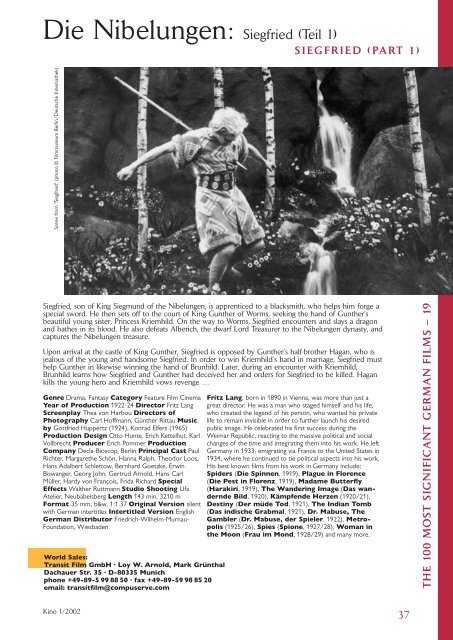Titel Kino 1/2002 - German Cinema
Titel Kino 1/2002 - German Cinema
Titel Kino 1/2002 - German Cinema
Create successful ePaper yourself
Turn your PDF publications into a flip-book with our unique Google optimized e-Paper software.
Die Nibelungen: Siegfried (Teil 1)<br />
SIEGFRIED (PART 1)<br />
Scene from "Siegfried" (photo © Filmmuseum Berlin/Deutsche Kinemathek)<br />
Siegfried, son of King Siegmund of the Nibelungen, is apprenticed to a blacksmith, who helps him forge a<br />
special sword. He then sets off to the court of King Gunther of Worms, seeking the hand of Gunther’s<br />
beautiful young sister, Princess Kriemhild. On the way to Worms, Siegfried encounters and slays a dragon<br />
and bathes in its blood. He also defeats Alberich, the dwarf Lord Treasurer to the Nibelungen dynasty, and<br />
captures the Nibelungen treasure.<br />
Upon arrival at the castle of King Gunther, Siegfried is opposed by Gunther’s half-brother Hagan, who is<br />
jealous of the young and handsome Siegfried. In order to win Kriemhild’s hand in marriage, Siegfried must<br />
help Gunther in likewise winning the hand of Brunhild. Later, during an encounter with Kriemhild,<br />
Brunhild learns how Siegfried and Gunther had deceived her and orders for Siegfried to be killed. Hagan<br />
kills the young hero and Kriemhild vows revenge …<br />
Genre Drama, Fantasy Category Feature Film <strong>Cinema</strong><br />
Year of Production 1922-24 Director Fritz Lang<br />
Screenplay Thea von Harbou Directors of<br />
Photography Carl Hoffmann, Günther Rittau Music<br />
by Gottfried Huppertz (1924), Konrad Elfers (1965)<br />
Production Design Otto Hunte, Erich Kettelhut, Karl<br />
Vollbrecht Producer Erich Pommer Production<br />
Company Decla-Bioscop, Berlin Principal Cast Paul<br />
Richter, Margarethe Schön, Hanna Ralph, Theodor Loos,<br />
Hans Adalbert Schlettow, Bernhard Goetzke, Erwin<br />
Biswanger, Georg John, Gertrud Arnold, Hans Carl<br />
Müller, Hardy von François, Frida Richard Special<br />
Effects Walther Ruttmann Studio Shooting Ufa<br />
Atelier, Neubabelsberg Length 143 min, 3210 m<br />
Format 35 mm, b&w, 1:1.37 Original Version silent<br />
with <strong>German</strong> intertitles Intertitled Version English<br />
<strong>German</strong> Distributor Friedrich-Wilhelm-Murnau-<br />
Foundation, Wiesbaden<br />
World Sales:<br />
Transit Film GmbH · Loy W. Arnold, Mark Grünthal<br />
Dachauer Str. 35 · D-80335 Munich<br />
phone +49-89-5 99 88 50 · fax +49-89-59 98 85 20<br />
email: transitfilm@compuserve.com<br />
<strong>Kino</strong> 1/<strong>2002</strong><br />
Fritz Lang, born in 1890 in Vienna, was more than just a<br />
great director. He was a man who staged himself and his life,<br />
who created the legend of his person, who wanted his private<br />
life to remain invisible in order to further launch his desired<br />
public image. He celebrated his first success during the<br />
Weimar Republic, reacting to the massive political and social<br />
changes of the time and integrating them into his work. He left<br />
<strong>German</strong>y in 1933, emigrating via France to the United States in<br />
1934, where he continued to tie political aspects into his work.<br />
His best known films from his work in <strong>German</strong>y include:<br />
Spiders (Die Spinnen, 1919), Plague in Florence<br />
(Die Pest in Florenz, 1919), Madame Butterfly<br />
(Harakiri, 1919), The Wandering Image (Das wandernde<br />
Bild, 1920), Kämpfende Herzen (1920/21),<br />
Destiny (Der müde Tod, 1921), The Indian Tomb<br />
(Das indische Grabmal, 1921), Dr. Mabuse, The<br />
Gambler (Dr. Mabuse, der Spieler, 1922), Metropolis<br />
(1925/26), Spies (Spione, 1927/28), Woman in<br />
the Moon (Frau im Mond, 1928/29) and many more.<br />
37<br />
THE 100 MOST SIGNIFICANT GERMAN FILMS – 19
















